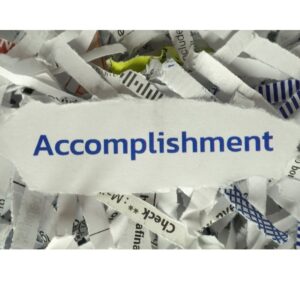Self-Assessment-You’ve been given the task of completing a self-evaluation. That means you must not only reflect on the previous year and demonstrate your value to the organisation you work for, but you must also do so with humility and a desire to learn.
Isn’t there any pressure?
Let’s break down all of the necessary stages, simplify things, and remove the fear of writing a self-evaluation from the equation. You can do it!
How Technology is Taking Over Retail and What to Do About It is the Future of Retail.
Before you start writing your self-evaluation, there are a few things you should know.

A lot of the work that goes into creating your own review is prep work. If you knew a self-evaluation was coming up, you might have been proactive and kept track of your accomplishments and challenges during the year. Congratulations in that situation! You’ve made it half way.
Don’t worry if the evaluation process caught you off guard or if you didn’t prepare. You have a lot of options for putting together a solid self-evaluation.
Top 10 Fundraising Crowdfunding Sites
1. Understand how the self-evaluation will be used.
Knowing why your manager has requested a self-evaluation is beneficial. Will he or she use it while writing your performance review? Will it be taken into account when you apply for increases or bonuses? How thorough should the assessment be? Is it necessary to incorporate any analytics? This information will serve as a good beginning point for your review and will eventually influence how you write it.
2. Make a list of all of your achievements.
It’s time to reflect on your accomplishments over the past year. Make a master list of everything you’ve accomplished. For the time being, include everything that comes to mind. When it comes time to write your evaluation, you may pare down that list to the essentials—the accomplishments you’re most proud of, and especially those that added the most value to the firm.
3. If you’re able to, gather data.
When at all possible, quantify your worth. “I improved customer retention” isn’t nearly as impressive as “I improved customer retention by 21%.” The extra time you spend doing some analysis before writing your review will pay off by highlighting the significance of your achievements. Data has a voice!
4. Make a list of your problems.
You shouldn’t just use your self-evaluation to brag about yourself. It’s critical to demonstrate that you’re aware of the difficulties you face on the job. Be thorough once more. When you start writing, you can narrow the list down to the most important topics.
Writing a Self-Assessment
You’re ready to start writing now that you’re organised. Here are a few pointers to help you keep your review positive and focused on showing your efforts while also advancing your career.
5. Reduce the number of accomplishments on your list.

Sure, you’ve accomplished a lot this year, but your assessment should focus on the highlights. Include any accomplishments for which you have evidence. Include the accomplishments you’re most proud of. Demonstrate your best work.
6. Remember to match your review to your manager’s or team’s objectives.
What were your manager’s or team’s objectives during the past year? What role did your efforts play in achieving those objectives? This information should be included in your self-evaluation so that your manager can see how you’ve contributed.
7. When describing your difficulties, keep a cheerful attitude.
It’s critical that you use positive language when describing problems you’ve encountered on the job. Your goal isn’t to draw attention to your mistakes, but to demonstrate your desire to learn from them. Offer your own answer to the situation wherever possible. Consider the following scenario:
Several deadlines were missed by me.
The term “failed” has a negative connotation. You don’t want your name to be associated with failure in the eyes of your boss. Instead, use positive words and demonstrate what you’ve done to resolve the issue:
I was able to pinpoint my time management issues after several missed deadlines. To stay on track, I’ve started making daily task lists.
Here’s a tip: run your self-review through IBM Watson’s Tone Analyzer before submitting it. Excellent scores in social inclinations such as agreeableness and conscientiousness. Anger or terror are red flag emotions to be aware of. Excessive confidence can come across as arrogant, while a tentative linguistic style can seem wishy-washy. Make an effort to strike a balance.
8. Keep your attention on yourself.
Don’t point fingers if you didn’t meet your goals—this is your review, not your team’s. Playing the blame game in your self-evaluation is not a good idea. If you have a problem with a coworker and believe it has harmed your performance, you should bring it to your manager’s notice separately, ideally before your performance evaluation.
9. Don’t forget to inquire about prospects for advancement.

Your self-evaluation is an excellent location to create a case for professional advancement. Remember that if you want something, you must be willing to ask for it. So, even if your supervisor hasn’t requested it, make your case for getting that certification, attending that training session, or registering for that conference. Your manager would most likely appreciate your eagerness to learn new things.
10. Remember the do’s and don’ts of self-evaluation.
Take into account any input you’ve gotten from others. If you have any, testimonials or significant quotes are OK. Demonstrate that others value your contributions.
Make a list, but not just any list. A bulleted list of your achievements does not demonstrate much effort on your behalf. Make a draught of your review. Thoughtfully.
Prioritize your tasks. When it comes to accomplishments, remember to focus on the highlights, and when it comes to obstacles, remember to focus on the significant concerns. Don’t make the mistake of including a to-do list.
Make sure you don’t make any mistakes. Even if writing isn’t a large part of your employment, typos and grammatical errors have no place in your self-evaluation. Proofread!
Get a second opinion if you can. Before you submit your self-evaluation, have a friend, family member, or trusted coworker read it over. They can assist you in not only checking for faults but also ensuring that your work is error-free.
Writing a self-evaluation doesn’t have to be a chore. You’ll be sure to impress if you organise yourself before you start, gather statistics whenever possible, and focus on the positive and progressive aspects. Not only that, but reflecting on the year in a way that honours your achievements and puts you on the correct track for self-improvement can be beneficial.
